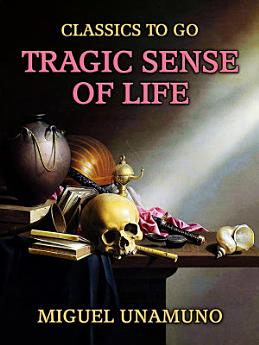Tragic Sense of Life
Sep 2023 · Otbebookpublishing
Ebook
290
Pages
family_home
Eligible
info
reportRatings and reviews aren’t verified Learn More
About this ebook
Tragic Sense of Life (in Spanish, "Del sentimiento trágico de la vida") is a philosophical work written by Miguel de Unamuno, a prominent Spanish philosopher, writer, and existentialist of the late 19th and early 20th centuries. The book delves into themes of existentialism, faith, and the human condition. In "Tragic Sense of Life," Miguel de Unamuno grapples with the fundamental questions of human existence and the meaning of life. He explores the complex and often paradoxical relationship between reason and faith, intellect and emotion, and the struggle to find meaning in a seemingly indifferent or hostile universe. Unamuno argues that humans have an inherent desire for immortality and an eternal truth, yet the uncertainty of life, the inevitability of death, and the limits of human understanding create a sense of existential anguish and tragedy. He delves into the inner conflicts and anxieties that arise from this confrontation between the desire for certainty and the awareness of our mortal nature. The author critiques the rationalism and scientific positivism of his time, asserting that reason alone cannot provide ultimate answers or fulfill the deeper yearnings of the human soul. He advocates for an embrace of the irrational, the passionate, and the unknown as crucial elements of the human experience. Throughout the book, Unamuno weaves in his personal struggles and experiences, infusing the philosophical exploration with a sense of authenticity and introspection. He invites readers to confront their own existential uncertainties and grapple with the enigma of human existence.
About the author
Miguel de Unamuno (1864-1936) was a towering figure in Spanish literature and philosophy, whose work traversed the realms of existentialism, modernism, and the Spanish Generation of '98. Born in Bilbao, Spain, Unamuno's early life was marked by the turbulent Carlist Wars, which profoundly influenced his worldview and literary voice. He became a professor of Greek and later the rector at the University of Salamanca, where his intellectual rigor and fiery oratory made him a beloved yet controversial figure.Unamuno's literary contributions are vast, spanning novels, essays, poetry, and plays. His works often grapple with themes of faith, identity, and the human condition, reflecting his deep existential concerns. He was a vocal critic of both the Spanish monarchy and the rise of fascism, which led to his exile during Miguel Primo de Rivera's dictatorship. His return to Spain was equally tumultuous, culminating in a dramatic confrontation with General Millán-Astray in 1936, where he famously declared, "You will win, but you will not convince."Unamuno's influence extends beyond his lifetime, impacting contemporary writers and thinkers such as Jorge Luis Borges and Gabriel García Márquez. His revolutionary ideas about the "tragic sense of life" and the quest for authenticity resonate with modern readers, who find in his works a timeless exploration of the human spirit's struggles and triumphs. Unamuno's legacy is that of a relentless seeker of truth, a beacon of intellectual courage, and a passionate advocate for the power of the written word to challenge and transform society.
Rate this ebook
Tell us what you think.
Reading information
Smartphones and tablets
Install the Google Play Books app for Android and iPad/iPhone. It syncs automatically with your account and allows you to read online or offline wherever you are.
Laptops and computers
You can listen to audiobooks purchased on Google Play using your computer's web browser.
eReaders and other devices
To read on e-ink devices like Kobo eReaders, you'll need to download a file and transfer it to your device. Follow the detailed Help Center instructions to transfer the files to supported eReaders.







